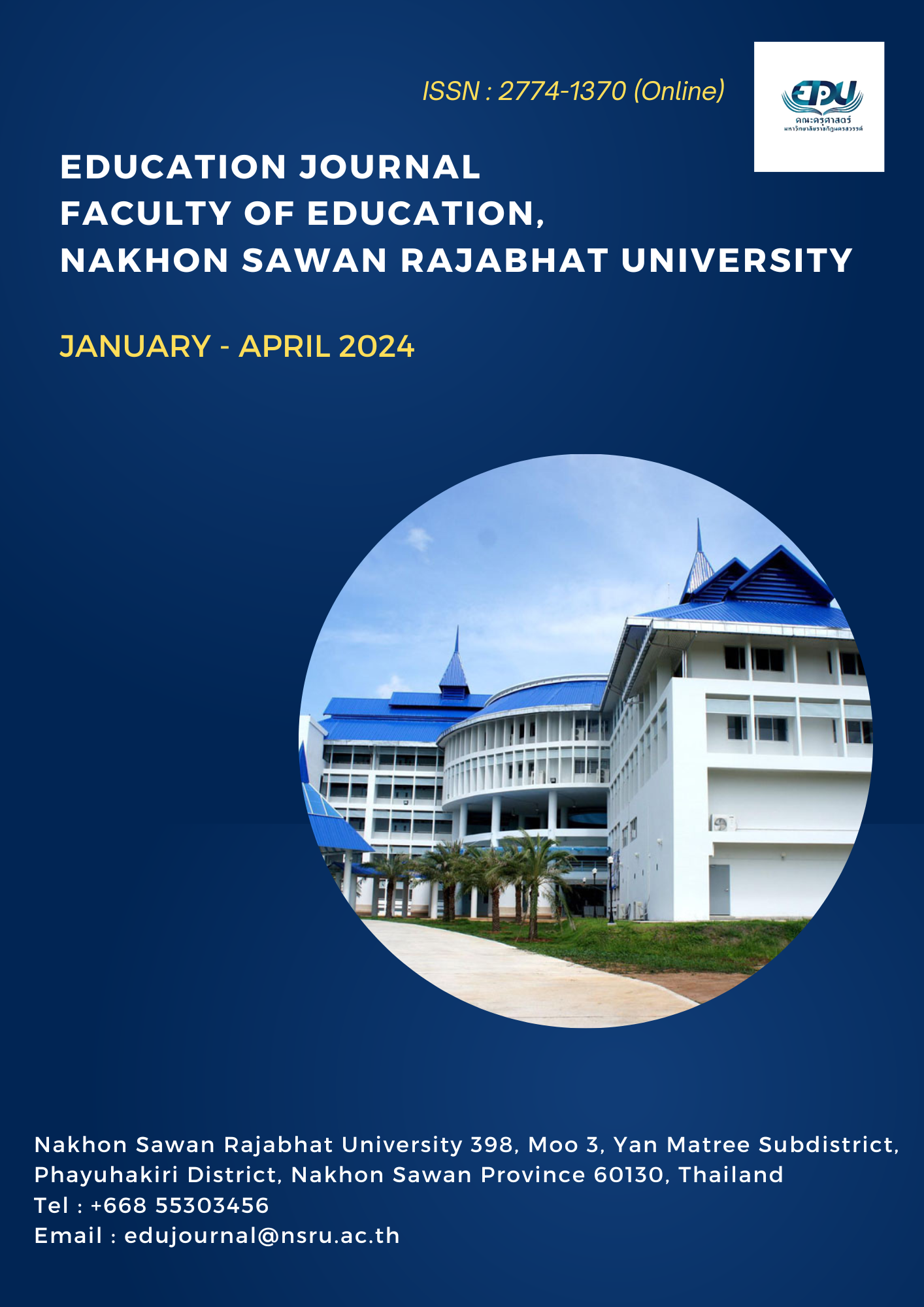Integration into Real Life: Applying Phenomenon-based in The Learning Process
Main Article Content
Abstract
Using Phenomenon-based learning to enhance meaningful understanding and learning in students. Phenomena are real-life occurrences that happen all around us, serving as genuine data. Utilizing phenomena as the basis for learning helps students understand how to apply knowledge in real-life situations and fosters problem-solving skills for everyday challenges. Managing to learn through a phenomenon-based approach emphasizes interdisciplinary learning, connecting various fields of knowledge, and nurturing individuals to become well-rounded and complete. Learning through real-life phenomena is inherently inquiry-based, placing students at the center of the learning process, encouraging diverse perspectives through questioning, and leading them to find answers. Students are empowered to create knowledge by themselves, extending their learning beyond the conventional classroom to the broader world. Technology is utilized, promoting information exchange to enhance students' knowledge in the 21st-century reality and inspiring them to expand their knowledge in the ten dimensions of competence. This article presents essential concepts and key features of managing learning through phenomenon-based approaches, providing educators and stakeholders with practical insights to integrate learning effectively into real-life scenarios.
Downloads
Article Details

This work is licensed under a Creative Commons Attribution-NonCommercial-NoDerivatives 4.0 International License.
References
ตะวัน ไชยวรรณ, และกุลธิดา นุกูลธรรม. (2564). การจัดการเรียนรู้โดยใช้ปรากฏการณ์เป็นฐาน: การเรียนรู้แบบบูรณาการ เพื่อส่งเสริมความรู้ของผู้เรียนในโลกแห่งความจริง. วารสารบัณฑิตศึกษา มหาวิทยาลัยราชภัฏวไลยอลงกรณ์ในพระบรมราชูปถัมภ์. 15(2): 256-257.
ทัณฑธร จุ้ยสวัสดิ์. (2564). การวิจัยเชิงปฏิบัติการในการจัดการเรียนรู้โดยใช้ปรากฏการณ์เป็นฐาน เรื่อง จลนศาสตร์เคมี ของนักเรียนชั้นมัธยมศึกษาปีที่ 5 เพื่อส่งเสริมผลสัมฤทธิ์ทางการเรียนและทักษะการคิดอย่างมีวิจารณญาณ.วิทยานิพนธ์ปริญญาการศึกษามหาบัณฑิต (การสอนวิทยาศาสตร์). มหาวิทยาลัยบูรพา.
พิมพรรณ สุริโย. (2552). ปัจจัยด้านผู้บริหารสถานศึกษาที่ส่งผลต่อประสิทธิผลของโรงเรียนเทศบาลกลุ่มการศึกษาท้องถิ่นที่ 9 กรมส่งเสริมการปกครองท่องถิ่น. วิทยานิพนธ์ครุศาสตรมหาบัณฑิต (การบริหารการศึกษา). มหาวิทยาลัย ราชภัฏเลย.
มูลนิธิสยามกัมมาจล ธนาคารไทยพาณิชย์ จำกัด (มหาชน). Phenomenon – Based Learning: การเรียนรู้โดยใช้ปรากฏการณ์เป็นฐาน. สืบค้นเมื่อ 31 พฤษภาคม 2566, จาก https://thepotential.org/knowledge/ phenomenon-based-learning/.
วาสนา เจริญสอน. (2552). ประสิทธิภาพการบริหารจัดการการศึกษาขององค์การบริหารส่วนตำบลในประเทศไทย.วารสารวิชาการมหาวิทยาลัยอีสเทิร์นเอเชีย. 2(2): 33-43.
สำนักงานคณะกรรมการการศึกษาขั้นพื้นฐาน. (2562). การจัดการเรียนรู้วิทยาศาสตร์สำหรับผู้มีความสามารถพิเศษด้านวิทยาศาสตร์ และคณิตศาสตร์ ณ University of Helsinki ประเทศฟินแลนด์. กรุงเทพฯ: ผู้แต่ง.
_______. (2562). รายงานการอบรมหลักสูตร Science Education for Science and Mathematically Gifted Learner the Normal Lyceum of Helsinki, Faculty of Behavioral Sciences in University of Helsinki 13 - 20 มีนาคม 2562. กรุงเทพ: ผู้แต่ง.
สำนักงานเลขาธิการสภาการศึกษา กระทรวงศึกษาธิการ. (2553). ข้อเสนอการปฏิรูปการศึกษาในทศวรรษที่สอง (พ.ศ. 2552-2561). กรุงเทพฯ: พริกหวานกราฟฟิค.
สุพัตรา ขันทอง. (2562). แนวทางการพัฒนาประสิทธิผลการจัดการศึกษาของโรงเรียนในสังกัดสำนักงานเขตพื้นที่การศึกษาประถมศึกษาลำพูน เขต 2. วิทยานิพนธ์ปริญญาศึกษาศาสตรมหาบัณฑิต (พัฒนศึกษา). มหาวิทยาลัยศิลปากร.
Anderson, L. W., & Krathwohl, D. R. (2001). Taxonomy for Assessing a Revision of Bloom's Taxonomy of Educational Objectives. New York: Longman.
Daehler, K., & Folsom, J. (2016). Making Sense of SCIENCE: Phenomena-Based Learning. Retrieved June 13, 2023. from: http://www.WestEd.org/mss.
Francis, C., Breland, T. A., Østergaard, E., Lieblein, G., & Morse, S. (2013). Phenomenon-based learning in agroecology: A prerequisite for trans disciplinarity and responsible action. Agroecology and Sustainable Food Systems. 37(1): 60–75.
Hoy, W. K., & Miskel, C. G. (2005). Educational Administration: Theory, Research and Practice. (7th ed.). ork: McGraw-Hill.
Islakhiyah, K., Sutopo, S., & Yulianti, L. (2018). Scientific Explanation of Light through Phenomenon-based Learning on Junior High School Student. Advances in Social Science, Education and Humanities Research. 218(ICoMSE 2017): 173–185.
Lähdemäki, J. (2018). Case Study: The Finnish National Curriculum 2016-A Co-created National Education Policy. In J. W. Cook (Ed.) Sustainability, human well-being, and the future of education. London: Palgrave Macmillan.
Mattila, P., & Silander, P. (2015). How to Create the School of the Future– Revolutionary thinking and design from Finland. Finland: Multprint.
Meltem Cı̇ men Dokuz Eylul University. (2021).Turkish Folk Music Lessons with Phenomenon-Based Learning: Preliminary Lessons and Results IAFOR. Journal of Education: Studies in Education. 9(6): 77 -91.
Nordberg, & Ahola-Luttila. (2019). Training report: Science Education for Science and Mathematical Gifted Learner the Normal Lyceum of Helsinki, Faculty of Behavioral Sciences in University of Helsinki. Retrieved June 13, 2023. from https://www.obec.go.th/wp-content/uploads/2019/06/ Finland-%E0%B8%AA%E0%B8%A7%E0%B8%81.pdf.
Nuora, P. & Välisaari, J. (2019). Kitchen chemistry course for chemistry education students: influences on chemistry teaching and teacher education – a multiple case study. Chemistry Teacher International. 2(1), 1–10.
Symeonidis, V., & Schwarz, J. F. (2016). Phenomenon-Based Teaching and Learning through the Pedagogical Lenses of Phenomenology. The Recent Curriculum Reform in Finland Forum Oświatowe. 28(2): 31–47.


